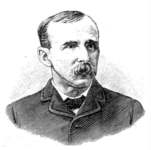The Whitehall Connection
Although officially brought into being on the First of September, 1896, the roots of New York State's Identification Bureau can be traced back to the once-bustling town of Whitehall, New York.
During the mid-1800's, Isaac V. Baker, a railroad magnate and politician, was one of the town's most prosperous residents. Isaac Baker had two sons, Isaac V. Baker, Jr. and Charles K. Baker.
 Isaac, Jr., born in 1843, was educated at the North Granville Academy, a highly regarded preparatory school, located near Whitehall. After graduation, he went on to the Brooklyn Collegiate and Polytechnic Institute, and in 1868, at the age of 25, was elected to the NY State Assembly. Mr. Baker served alternately as an Assemblyman and a Senator until 1881, while also overseeing the interests of the railroads.
Isaac, Jr., born in 1843, was educated at the North Granville Academy, a highly regarded preparatory school, located near Whitehall. After graduation, he went on to the Brooklyn Collegiate and Polytechnic Institute, and in 1868, at the age of 25, was elected to the NY State Assembly. Mr. Baker served alternately as an Assemblyman and a Senator until 1881, while also overseeing the interests of the railroads.
The Baker family sold the State of New York a sizable portion of land outside of Comstock, upon which the Great Meadow Prison was eventually built. In 1882, Isaac V. Baker, Jr. was appointed Superintendent of the New York State Department of Prisons.
Charles K. Baker, also a North Granville Academy graduate and State Assemblyman, was given the position of Chief Clerk for the Prison Department, a job he held for nearly thirty years.
Another wealthy and well-landed family of the Whitehall vicinity were the Davises. Emerson E. Davis, Sr. was an Assemblyman and a close personal friend of Governor Tilden. His daughter, Marion, became the wife of Charles K. Baker; his son, Emerson E. Davis, Jr. became a Department of Prisons official.
Although not as wealthy or politically connected as the Bakers or the Davises, the Parke family of Whitehall also played a role in the early days of New York's Identification Bureau.
 James H. H. Parke was a prominent local merchant who owned a large store and a great deal of property. His son, James H. Parke, attended the North Granville Academy and was a good friend of Charles K. Baker.
James H. H. Parke was a prominent local merchant who owned a large store and a great deal of property. His son, James H. Parke, attended the North Granville Academy and was a good friend of Charles K. Baker.
Unlike the Baker brothers and Emerson Davis, James Parke remained in Whitehall. He married in 1876, had two children and settled in to take charge of the family business.
While living in Whitehall, Parke joined the local militia and rose to the rank of Captain before being forced to resign due to incompetence. He was allowed an honorable discharge, however, and retained the title of "Captain" throughout his life.
Parke was also a less than competent merchant, preferring to spend his time traveling and speculating on investments. This cost him most of the family's wealth and holdings and, in 1898, after his wife left him for another man, Parke turned to his friends in the Prison Department. On May 14 of that year, at the age of 50, he was granted a job as guard at Auburn Prison.